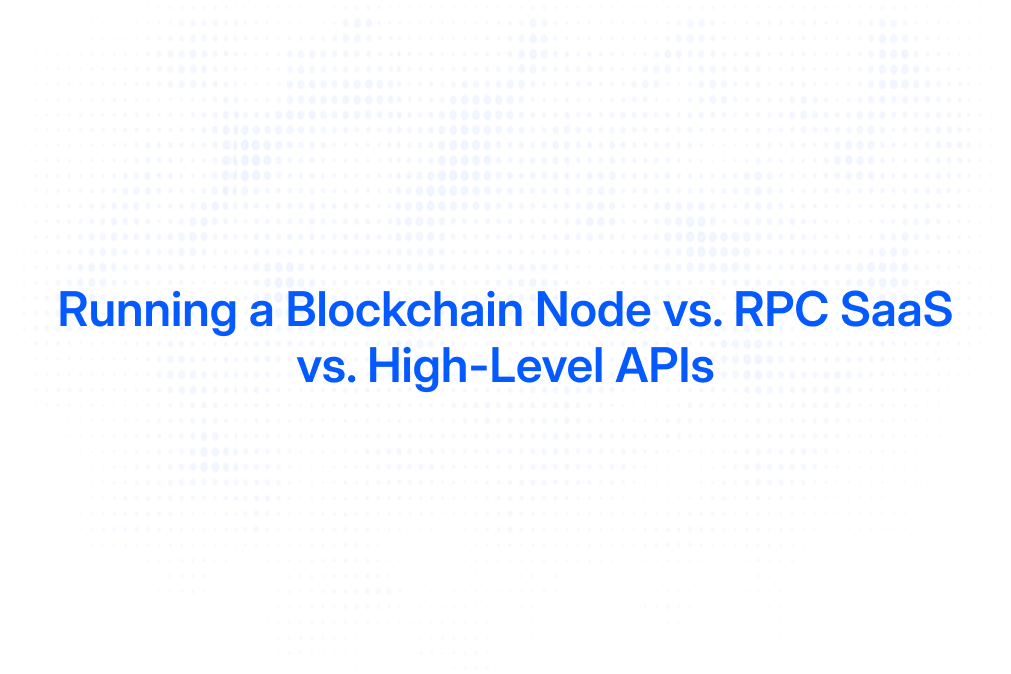Uniblock vs Infura: The Cost of Single-Provider Dependence
In the rapidly evolving Web3 landscape, blockchain developers and projects rely heavily on Remote Procedure Call (RPC) providers to interact with decentralized networks. Among the most popular RPC providers are Infura and Uniblock, each offering unique solutions to meet the demands of blockchain applications. However, the choice between a single-provider model like Infura and a multi-provider routing platform like Uniblock can have significant implications on cost, reliability, and scalability.
This article delves into the critical differences between Uniblock and Infura, focusing on the often overlooked but crucial aspect of single-provider dependence. Understanding these differences can help Web3 developers optimize their infrastructure, reduce risks, and ultimately build more resilient blockchain applications.
Understanding RPC Providers and Their Role in Web3
Remote Procedure Call (RPC) providers serve as the backbone for blockchain applications, enabling communication between decentralized networks and client applications. They facilitate API calls that allow developers to query blockchain data, submit transactions, and interact with smart contracts without running full nodes themselves.
Infura has long been a dominant player in this space, offering a reliable and straightforward RPC service primarily for Ethereum and IPFS. Its simplicity and widespread adoption have made it a go-to choice for many developers. However, Infura operates as a single-provider platform, which introduces certain risks and limitations. For instance, if Infura experiences downtime or throttling, developers may face disruptions in their applications, leading to potential loss of user trust and engagement. This reliance on a single provider can also raise concerns regarding data privacy and centralization, as all requests are funneled through one entity, making it easier for malicious actors to target and exploit vulnerabilities.
Uniblock, on the other hand, is an RPC aggregator and auto-routing platform that connects multiple RPC providers, including Infura, Alchemy, QuickNode, and others. This multi-provider approach aims to enhance reliability, reduce latency, and optimize costs by dynamically routing requests to the best available endpoint. By leveraging the strengths of various providers, Uniblock minimizes the risk of downtime and ensures that developers can maintain seamless interactions with the blockchain. Additionally, this flexibility allows developers to choose the most cost-effective solutions for their specific needs, which can be particularly beneficial for startups and smaller projects that may have tighter budgets.
Moreover, the rise of RPC aggregators like Uniblock highlights a growing trend in the Web3 ecosystem towards decentralization and resilience. As more developers recognize the importance of diversifying their infrastructure, they are increasingly adopting solutions that mitigate the risks associated with single points of failure. This shift not only fosters a more robust environment for blockchain applications but also encourages innovation, as developers are free to experiment with different RPC providers and configurations without being locked into a single service. As the Web3 landscape continues to evolve, the role of RPC providers will undoubtedly expand, paving the way for more sophisticated and user-friendly decentralized applications.
The Hidden Risks of Single-Provider Dependence
Service Outages and Downtime
One of the most significant risks of relying on a single RPC provider like Infura is the potential for service outages. When a single provider experiences downtime, all applications depending solely on that provider are affected, leading to transaction failures, delayed data retrieval, and poor user experience.
Infura has faced notable outages in the past, sometimes lasting several hours, which have impacted major decentralized applications (dApps) and projects. These outages highlight the vulnerability of single-provider dependence, especially for mission-critical applications where uptime is paramount.
Limited Redundancy and Failover Options
Single-provider models inherently lack redundancy. Without alternative endpoints to fall back on, applications have no failover mechanism during provider failures. This absence of failover can lead to increased downtime and unplanned disruptions.
In contrast, platforms like Uniblock implement RPC auto-routing and failover strategies that automatically switch requests to healthy endpoints among multiple providers. This redundancy significantly improves reliability and ensures continuous service availability.
Vendor Lock-In and Reduced Flexibility
Dependence on a single RPC provider can lead to vendor lock-in, limiting developers’ flexibility to switch providers or adopt new technologies. This lock-in may result in higher costs over time, as providers might increase pricing or restrict features without competitive pressure.
Multi-provider platforms like Uniblock empower developers with the flexibility to integrate various RPC providers seamlessly. This flexibility not only mitigates lock-in risks but also enables projects to leverage the best features and pricing models available in the market.
Cost Implications: Why Multi-Provider Routing Matters
Optimizing RPC Costs with Auto-Routing
RPC calls can become a significant expense for blockchain projects, especially those scaling to millions of API requests daily. Infura’s pricing, while competitive initially, can escalate quickly as usage grows, potentially straining budgets.
Uniblock’s multi-provider auto-routing technology offers a cost-optimization advantage by dynamically routing requests to the most cost-effective RPC endpoints. This approach can reduce RPC costs by up to 40%, a substantial saving for startups and enterprises alike.
Balancing Cost with Performance
Cost savings should not come at the expense of performance. Uniblock’s routing algorithms consider latency, regional availability, and provider health to balance cost with speed and reliability. This ensures that applications maintain optimal performance while minimizing expenses.
By contrast, single-provider solutions like Infura may not offer the same level of granular control or cost-performance balancing, potentially leading to higher latency or unnecessary expenses during peak demand periods.
Reliability and Scalability: Meeting the Demands of Modern Web3 Apps
Reducing Latency with Multi-Region Routing
Latency is a critical factor in user experience for blockchain applications. Infura’s infrastructure, while robust, is limited to its own data centers, which may not always be optimally located relative to end-users.
Uniblock leverages multi-region RPC routing, distributing requests across geographically diverse providers. This reduces latency by directing traffic to the closest or fastest endpoint, improving responsiveness and user satisfaction.
Scaling API Calls Without Breaking the Budget
As blockchain applications scale, they must handle millions of API calls efficiently. Single-provider platforms can become bottlenecks, both in terms of capacity and cost.
Uniblock’s architecture supports scaling by aggregating multiple RPC providers, distributing load, and preventing any single endpoint from becoming overwhelmed. This multi-provider model also protects against sudden spikes in demand, ensuring consistent performance.
Comparing Uniblock and Infura: Which Solution Fits Your Needs?
Use Cases Favoring Infura
Infura remains a strong choice for developers seeking a straightforward, easy-to-integrate RPC provider with solid Ethereum support. Its mature infrastructure and developer tools make it suitable for smaller projects or those with predictable usage patterns.
However, projects with high availability requirements or those anticipating rapid growth may find Infura’s single-provider model limiting.
Advantages of Choosing Uniblock
Uniblock’s multi-provider RPC routing offers significant advantages for projects prioritizing uptime, cost efficiency, and scalability. By mitigating the risks associated with single-provider dependence, Uniblock enables developers to build resilient, high-performance applications that can adapt to changing network conditions.
Furthermore, Uniblock’s ability to integrate multiple providers means developers can avoid vendor lock-in, optimize costs dynamically, and reduce latency through intelligent routing.
Conclusion: The Strategic Importance of Multi-Provider RPC Routing
In the competitive and fast-paced Web3 ecosystem, infrastructure decisions have a profound impact on application success. While Infura offers a reliable and well-established RPC service, its single-provider nature introduces risks and cost inefficiencies that can hinder growth and resilience.
Uniblock’s multi-provider RPC routing addresses these challenges by providing redundancy, cost optimization, and enhanced performance through intelligent routing across multiple RPC endpoints. This approach not only reduces the hidden costs of downtime and vendor lock-in but also empowers developers to scale confidently.
For blockchain projects aiming to future-proof their infrastructure and deliver seamless user experiences, embracing multi-provider RPC solutions like Uniblock is a strategic move that balances cost, reliability, and scalability.
Ready to enhance your Web3 project's performance and resilience? Join the ranks of over 2,000 developers who have already chosen Uniblock for seamless blockchain connectivity across 100+ chains. Say goodbye to vendor lock-in, embrace cost-effective scaling, and let Uniblock's intelligent routing system simplify your infrastructure management. Start building with Uniblock today and future-proof your decentralized applications.
.svg)


.png)



